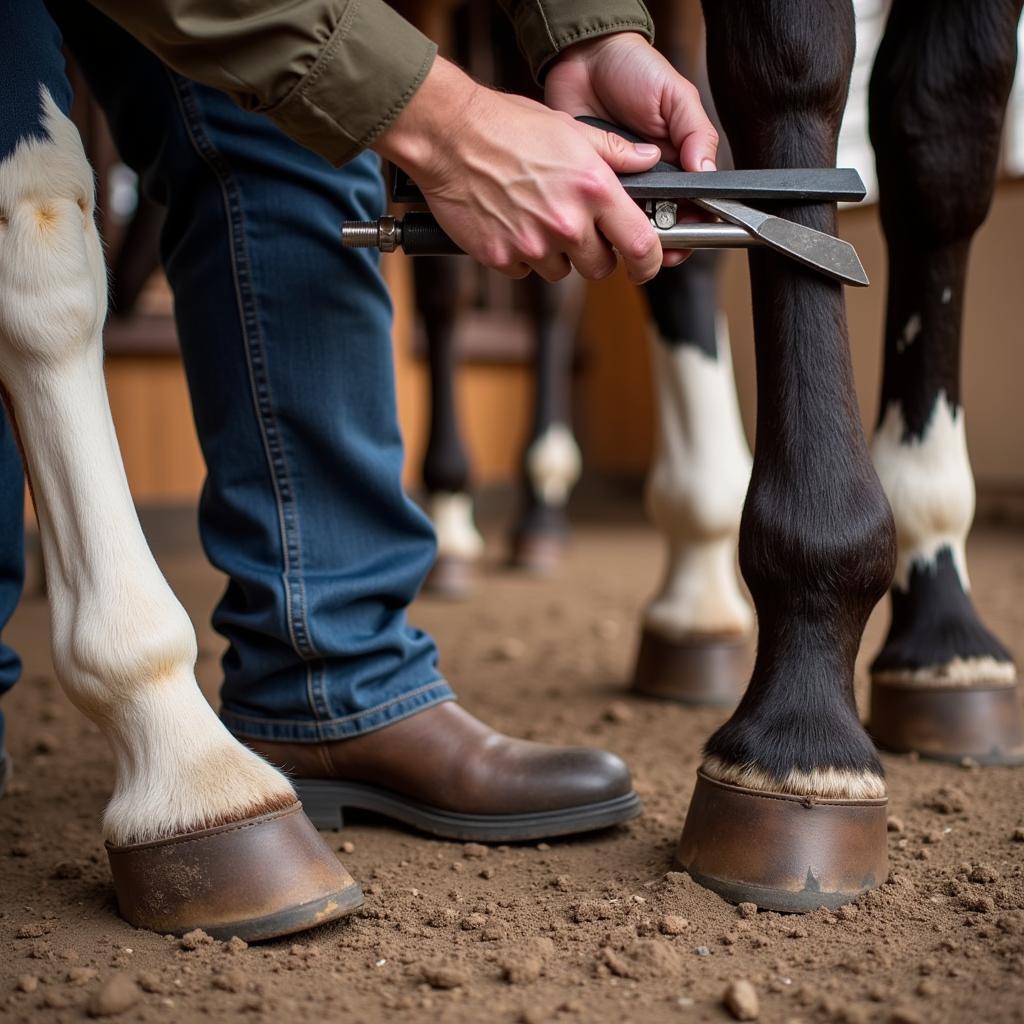Choosing the right Shoes For Riding Horses is a crucial decision for any equestrian. It directly impacts the horse’s comfort, performance, and overall well-being. From protecting hooves to providing traction, understanding the nuances of horse footwear is essential for responsible horse ownership. This guide explores the various types of shoes available, their benefits, and how to make the best choice for your equine partner.
Understanding the Importance of Shoes for Riding Horses
Horses’ hooves are constantly subjected to wear and tear, especially for riding horses that work on varying terrains. Shoes provide a protective layer, preventing chipping, cracking, and excessive wear. They also offer support and traction, crucial for maintaining balance and preventing slips, especially during demanding activities. Choosing the right shoes can significantly enhance your horse’s performance and longevity. For riders in Sarasota, proper hoof care is especially important, check out our resources on horse riding lessons sarasota fl.
What are the primary benefits of shoes for riding horses? They safeguard hooves, offer vital support, and enhance traction, contributing to improved performance and overall well-being.
Types of Shoes for Riding Horses
There is a wide array of horseshoe options available, each designed for specific needs and disciplines. The most common types include:
- Steel Shoes: These are the traditional choice, offering excellent durability and traction on various surfaces. They are suitable for most disciplines and are particularly useful for horses working on hard ground. Steel shoes are often preferred for horses with specific hoof conditions requiring extra support.
- Aluminum Shoes: Lighter than steel, aluminum shoes reduce strain on the horse’s legs and are often favored for performance horses. They offer good grip and are often used in disciplines requiring speed and agility.
- Composite Shoes: Made from materials like polyurethane or plastic, composite shoes are even lighter than aluminum. They offer excellent shock absorption, benefiting horses with sensitive hooves or joint issues. These shoes are increasingly popular for recreational riding and trail riding.
Additionally, specialized shoes exist for therapeutic purposes and specific disciplines. For example, some shoes have built-in pads or features to address specific hoof problems.
Choosing the Right Shoes: Factors to Consider
Several factors influence the choice of shoes for riding horses, including:
- Discipline: The type of riding activity significantly impacts the type of shoe needed. Dressage horses might require different shoes compared to jumping or trail riding horses.
- Terrain: The riding surface plays a key role. Horses working on hard ground benefit from durable shoes like steel, while those on softer surfaces might prefer lighter options like aluminum or composite.
- Hoof Condition: Horses with existing hoof problems or sensitivities might require specialized shoes or padding for optimal comfort and support.
- Farrier Consultation: Consulting a qualified farrier is essential. They can assess the horse’s individual needs and recommend the most appropriate type of shoe, ensuring a perfect fit and optimal performance.
 Farrier Applying New Shoes to a Horse
Farrier Applying New Shoes to a Horse
Caring for Shod Horses
Proper hoof care is essential for horses wearing shoes. Regular cleaning and inspection of the hooves are necessary to identify any issues early on. Scheduled farrier visits are crucial for trimming the hooves, resetting or replacing shoes, and ensuring the horse’s continued comfort and soundness. Remember to schedule regular horseshoeing appointments and maintain good hoof hygiene. You can learn more about horse riding in other locations, like Mallorca, through our horse riding mallorca page.
What about barefoot horses?
Some riders opt for barefoot trimming, allowing horses to go without shoes. This approach can be suitable for certain horses and disciplines but requires careful management and attention to hoof health. It’s best to discuss the barefoot option with a veterinarian and/or a farrier who specializes in barefoot trimming.
Conclusion
Selecting the correct shoes for riding horses is vital for their well-being and performance. By understanding the various types of shoes available and considering factors like discipline, terrain, and hoof condition, you can make informed decisions that benefit your equine partner. Always consult a qualified farrier for personalized advice and ensure proper hoof care for your shod horse. Interested in riding lessons in Fresno? Visit our page on horse riding lessons fresno. For those in Door County, Wisconsin, you might find our guide on horse riding door county wi helpful. Finally, if you’re curious about steel horse shoes specifically, check out our detailed guide on steel horse shoes.
FAQ
- How often should horse shoes be replaced? Generally, every 4-8 weeks, depending on the horse’s individual needs and activity level.
- Can all horses wear shoes? While most riding horses benefit from shoes, some horses with specific hoof conditions might not be suitable candidates.
- What are the signs of ill-fitting horse shoes? Lameness, unusual gait, and signs of discomfort are indicators of potential problems.
- How much does it cost to shoe a horse? Prices vary depending on the type of shoes used, the farrier’s fees, and the location.
- What is the best type of shoe for a jumping horse? Aluminum shoes are often preferred for jumping due to their lightweight and good grip.
- How can I tell if my horse needs new shoes? A farrier can assess the wear and tear of the shoes and the condition of the hooves to determine if new shoes are necessary.
- Are there shoes specifically for trail riding? Yes, composite shoes are often a good choice for trail riding due to their shock absorption and lightweight nature.
When you need support, please contact Phone: 0772127271, Email: [email protected] Or visit us at: QGM2+WX2, Vị Trung, Vị Thuỷ, Hậu Giang, Việt Nam. We have a 24/7 customer care team.